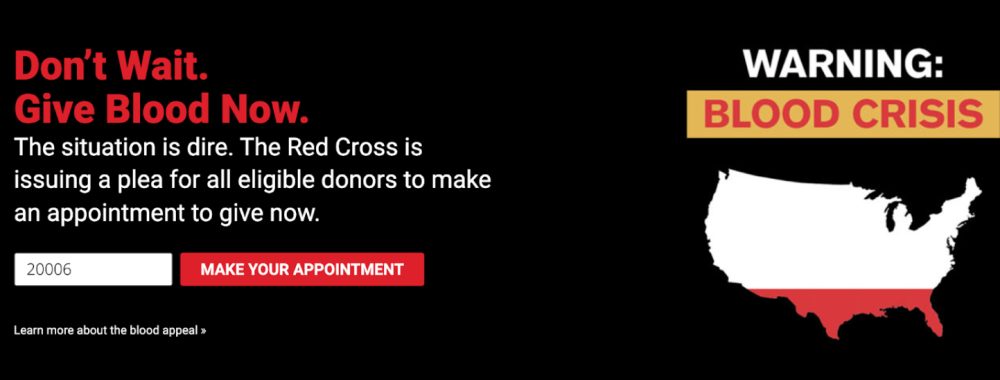WASHINGTON – America needs more blood.
Blood supplies, which typically run at about a five-day stock on hospital shelves, have been reduced to less than a one-day supply of certain blood types, according to Ashley Henyan, communications director for the American Red Cross. That is also the case in the national capital region.
Blood already has a limited 42-day shelf life, and blood platelets last only five days. Regular donors would have to roll up their sleeves once every 56 days to give the Red Cross the reserve it is more accustomed to.
The shortages come as the Red Cross, in a study funded by the Food and Drug Administration, examines the viability of changing existing donation rules to permit gay and bisexual men to donate blood without a long waiting period after their last sexual contacts with other men.
The blood shortage and looming expiration dates of the blood available on the shelves also pose additional difficulties to a medical system already experiencing severe challenges during the COVID pandemic.
Blood donations usually see a decrease in the summer months, throughout the holiday season and during the winter months. Outside of these time periods, donations typically increase.
“We’re just not seeing it bounce back,” Henyan told Capital News Service. “So because it stayed at this low point for so many months in a row now, that’s what’s making it a crisis.”
Henyan also pointed out that blood “cannot be manufactured, it cannot be produced, and it cannot be stockpiled,” factors that make a steady supply of donors absolutely critical to resolving the shortage. She also cited that there is currently “less than a one-day” supply for Maryland and the District of Columbia.
“It’s kind of leading to this perfect storm where we’re unable to collect as much, but you need more,” said Kate Fry, CEO of America’s Blood Centers, an organization that works alongside the Red Cross and helps distribute donated blood to regions where it needs to be.
Fry also works to counteract misinformation about blood donation during the pandemic. “If you’re vaccinated or unvaccinated, you can still donate blood,” she said.
Despite the blood shortages, the FDA still has policies in place barring men from donating blood until three months after their most recent sexual encounter with other men.
This three-month period replaced a 12-month period in the spring of 2020, an attempt by the FDA to allow more flexibility in blood donations during a shortage. However, the changed guidance isn’t sufficient to solve the shortage problem, or include sexually-active gay and bisexual men in more frequent blood donations, according to Henyan.
“I think it’s unfortunate how many gay and bisexual men feel excluded, not just are excluded, but actually feel excluded from donating blood,” said Christian Morris, a recruitment specialist with the Whitman-Walker Institute, a Washington-based LGBTQ research, policy and advocacy organization founded in 1973 as an HIV clinic.
Morris has recruited almost 300 participants with the Whitman-Walker Institute for what is being called “the Assessing Donor Variability and New Concepts in Eligibility,” or ADVANCE, study.
The study “hopes to provide evidence to repeal the current policy that discriminates against the participation of gay and bisexual men in donating blood,” according to Morris. Instead, the donation policy could be changed to rely on a case-by-case risk assessment for each potential donor.
Josh Sorbe, a 24-year-old participant from Washington, found out about the ADVANCE study through Twitter and decided to donate blood at the Washington location because it was a way to give back during Pride Month in October.
Sorbe told CNS the whole process took three weeks and included a health history questionnaire and donating four vials of blood. He said he hopes that the study will modernize FDA guidance on donating blood.
“A lot of data is rooted potentially in homophobia from the 20th century and this groundbreaking study really allows us to bring the discussion about blood eligibility donation requirements into 2022,” Sorbe said.
While the ADVANCE study is still ongoing, Morris said he is “confident” that the FDA policy on gay and bisexual men donating blood will be updated within the next couple of years.
For Sorbe, updated guidance would be deeply satisfying.
“The queer community…is willing to step up when people need help, and the fact that some of the most likely givers are still ruled out from archaic eligibility requirements is absurd to me,” he said. “So, I’m really hoping this allows us to have the conversation (of) who can donate blood. It’s super easy, it’s not hard to do and it’s one of the best things you can do that can change someone’s life.”

